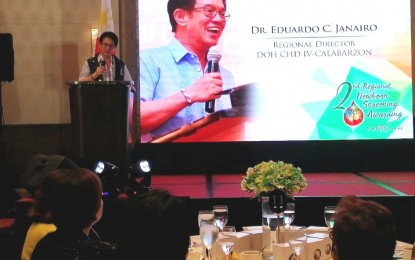
FURTHER RESEARCH ON NBS. DOH Calabarzon director, Dr. Eduardo Janairo, urges participants and awardees to engage in research to open new leads and discover breakthroughs, during the 2nd Regional New Born Screening Awards in General Trias City, Cavite on Tuesday (Oct. 22, 2019). NBS, which was introduced in the country in 1999, is a simple procedure where a few drops of blood are taken from the baby's heel and ideally done immediately after 24 hours from birth to find out if a baby has a congenital disorder that may lead to mental retardation or even death if left untreated. (PNA photo by Gladys S. Pino)
GENERAL TRIAS CITY, Cavite -- As the newborn screening (NBS) procedure is still considered new in the country's health system, a Department of Health (DOH) official urged NBS implementers to engage in research to open new leads and discover breakthroughs.
"Pwede nyo gawin yun, we will fund you to do that," (you can do that, we will fund you to do that) said DOH Calabarzon director, Dr. Eduardo C. Janairo in his address before NBS implementers from the region's public and private institutions during the 2nd Regional New Born Screening Awarding Ceremony held at the Bayleaf Hotel here on Tuesday.
He shrugged off the idea that only scientists can do research.
"You just have to get a bunch of committed and very passionate people to look into the newborn screening," Janairo said.
Janairo pointed out that findings in whatever studies conducted abroad on NBS may not be applied locally as the Philippines has a different culture, physiology, and laws.
He advised the participants to start at the local level by simply comparing or looking for perspective, longitudinal, respective studies or even for a clinical trial, as the NBS only started in the country in 1999.
"Yun ang kailangan nating hanapin, all those addresses na nagkaroon ng disorders, boys and girls during those days and see how they went through with the disease that they had, initially identified at ano ang ginawa nila," he said. (Those are the things that we need to search, the addresses of those who had disorders, boys and girls during those days and see how they went through with the disease that had initially identified and what they did)
Janairo likewise asked the participants to check on the relationship or the participation of the traditional complementary and alternative medicine for the care of the newborn, and as they grow old.
Citing that the Philippine Institute for Traditional Alternative Healthcare (PITAH) also has funds for research, Janairo said the organization may have modalities that can be used by NBS implementers.
He reminded participants that Traditional Complementary and Alternative Medicine (TCAM) uses natural/organic food and nutrition, in practicing homeopathy (anything at home that we see).
"And of course you have all others, the balancing of energy, the balancing of the yin and the yang, the removal of blockade on acupuncture pressure, massage, chiropractic - all these modalities can be used to take care of a child to prevent any ensuing disease that is from the NBS," he stressed.
Janairo hopes to include "simple research" among the awarding categories during the 3rd Regional NBS awarding ceremony, with emphasis on what have done in the past or their future findings using TCAM.
NBS, a simple procedure where a few drops of blood are taken from the baby's heel and ideally done immediately after 24 hours from birth, is conducted to find out if a baby has a congenital disorder that may lead to mental retardation or even death if left untreated.
The expanded NBS program increased the screening panel of disorders from six to more than 28. This test is included in the Newborn Care Package, a PhilHealth benefit package for essential health services of the newborn during the first few days of life.
Republic Act No 9288, otherwise known as An Act Promulgating a Comprehensive Policy and a National System for Ensuring Newborn Screening, was enacted in 2004. The first week of October of each year was declared as New Born Screening month under Proclamation N0. 540 s. 2004. (PNA)
